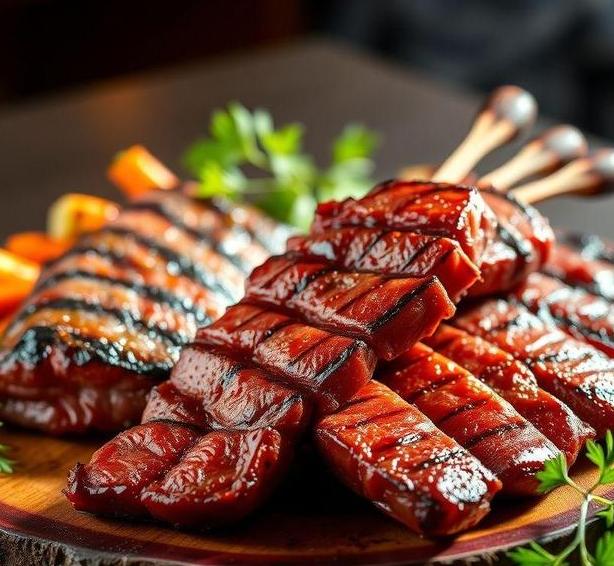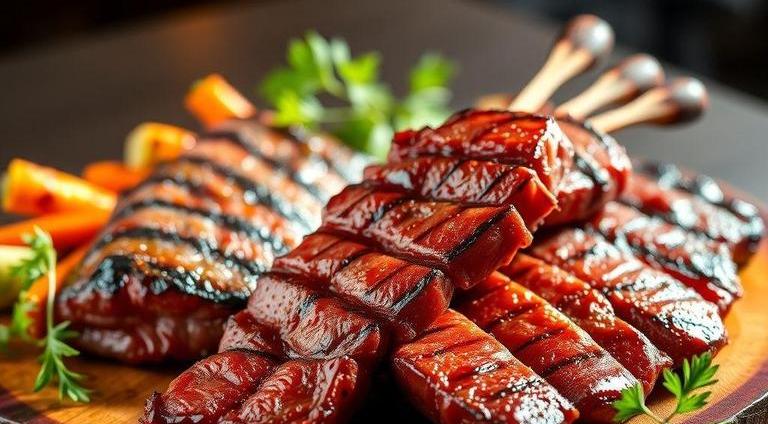When it comes to a backyard BBQ, few things are more satisfying than sinking your teeth into a perfectly grilled piece of meat. Whether it’s ribs, brisket, burgers, or chicken, BBQ meat is the star of many summer celebrations, family gatherings, and weekend cookouts. But once the last plate is served, the question arises: How long can you keep those delicious leftovers? And, more importantly, can BBQ meat go bad?
In this guide, we’re diving deep into BBQ meat spoilage, shelf life, how to store it, and the signs that tell you if it’s no longer safe to eat. Whether you’re a seasoned griller or just learning the ropes, these insights will ensure that you get the most out of your BBQ meat-without risking foodborne illness. Let’s dig in!
Can BBQ Meat Go Bad?
Absolutely. BBQ meat, like any other cooked food, can go bad over time. The process of spoilage depends on a variety of factors, including the type of meat, how it was cooked, how long it’s been stored, and the conditions in which it’s kept. While BBQ meat tends to be cooked at high temperatures, which kills off many harmful bacteria, it’s still very vulnerable once it cools down.
Here are a few important things to consider when thinking about BBQ meat spoilage:
- Bacterial Growth: Bacteria like Salmonella, E. coli, and Listeria thrive in moist, warm environments, making improperly stored BBQ meat a prime target.
- Time and Temperature: The more time BBQ meat spends at room temperature, the greater the risk of bacterial contamination. If you leave your leftovers out too long, you could be setting yourself up for an unpleasant and potentially dangerous experience.
- Storage Methods: How you store BBQ meat after cooking plays a significant role in its shelf life. Proper refrigeration or freezing is crucial to slowing down spoilage and preserving the taste and texture of your BBQ.
Shelf Life For BBQ Meat

Knowing the shelf life of BBQ meat is key to keeping your leftovers safe. The length of time your BBQ meat stays good depends on a variety of factors like how it’s stored and whether it’s been kept at the proper temperature. Here’s a breakdown of what you can expect for different storage methods:
-
In The Fridge (Refrigerated Storage)
- BBQ meat can last 3 to 4 days in the refrigerator when stored properly in an airtight container or tightly wrapped in plastic wrap or aluminum foil.
- The fridge should always be set at or below 40°F (4°C) to keep your meat from spoiling.
-
In The Freezer (Frozen Storage)
- If you decide to freeze your BBQ leftovers, you can extend their shelf life significantly. BBQ meat can last 2 to 6 months in the freezer, depending on the type of meat and how well it’s packaged.
- To prevent freezer burn, be sure to use freezer-safe bags or containers and wrap the meat tightly. This will help preserve its flavor and texture.
-
Vacuum Sealed BBQ Meat
- Vacuum sealing your BBQ meat can also lengthen its shelf life, whether you refrigerate or freeze it. Vacuum-sealed meat can last 1-2 weeks in the fridge and up to 1 year in the freezer, as it minimizes exposure to air, which accelerates spoilage.
Common Signs Of Spoilage
Even if you’ve stored your BBQ meat properly, it’s essential to know the common signs of spoilage to avoid eating anything that could make you sick. These signs can be subtle, so it’s important to be cautious and thorough when assessing your leftovers.
Off Smell
- One of the first signs that BBQ meat has gone bad is a change in its smell. If it starts to give off a sour, rotten, or overly tangy odor, it’s time to toss it.
- Always trust your nose-if the meat smells off, it’s a clear indicator of bacterial growth and spoilage.
Change In Texture
- Fresh BBQ meat should feel tender and juicy. If it becomes slimy, sticky, or overly dry, it may be a sign of spoilage.
- Also, pay attention to the color. If the meat starts to turn a dull, grayish color (especially chicken or pork), that could indicate it’s no longer safe to eat.
Discoloration
- While BBQ meat may darken slightly due to the smoke or marinade, drastic discoloration (like green or brownish hues) is a sign of bacterial contamination.
- Ribs, brisket, and other dark meats can be especially susceptible to discoloration, so check for any unusual color changes when you’re inspecting leftovers.
Mold Growth
- If you notice any fuzzy patches or greenish spots on your BBQ meat, it’s a definite sign of mold. While some molds can be harmless, many are not and can cause serious health issues.
- Always discard BBQ meat with visible mold.
Unpleasant Taste
- While not the most reliable sign (since you should never eat questionable meat in the first place), an off taste can signal spoilage. If your BBQ meat tastes sour or “off”, spit it out and discard the rest. Eating spoiled meat is a gamble you don’t want to take.
How To Store BBQ Meat?

Proper storage is key to maintaining the quality and safety of your BBQ meat. Here are some tried-and-true methods for storing your leftovers, ensuring you get the most out of your cooking:
Cool The Meat Quickly
- Don’t let your BBQ meat sit at room temperature for more than 2 hours. If it’s a hot day (above 90°F), that time drops to 1 hour.
- To speed up cooling, slice larger cuts of meat into smaller pieces before storing them. This helps them cool faster and prevents bacterial growth.
Use Airtight Containers
- Store your BBQ meat in airtight containers or resealable plastic bags. If you’re using plastic wrap or foil, make sure the meat is wrapped tightly to avoid air exposure, which can cause freezer burn and spoilage.
- For larger quantities, consider using vacuum-sealed bags, which are ideal for long-term storage.
Refrigerate And Freeze Immediately
- Once your BBQ meat is cooled, move it to the fridge or freezer without delay. This will help prevent the growth of harmful bacteria.
- If you’re planning to freeze the leftovers, ensure they’re packaged tightly and label them with the date so you know when to use them.
Avoid Storing With Sauces Or Marinades
- If possible, store BBQ meat without sauces or marinades. Sauces can alter the texture and make it more difficult to assess spoilage.
- You can always reheat your BBQ meat and add fresh sauce when ready to serve.
Expert Tips
- Don’t Reheat Too Many Times: Each time you reheat BBQ meat, it enters the “danger zone” (40°F to 140°F), which promotes bacterial growth. Only reheat what you plan to eat, and try to limit reheating to once.
- Use a Meat Thermometer: When reheating, ensure the meat reaches an internal temperature of 165°F (74°C) to kill any potential bacteria.
- Use Leftovers Creatively: If you have too much leftover BBQ meat, get creative with your meals. Turn it into sandwiches, tacos, wraps, or even BBQ-stuffed potatoes!
- Portion Control: If you tend to cook a lot at once, consider freezing individual portions of BBQ meat. That way, you can easily defrost only what you need without wasting any leftovers.
FAQs
Can BBQ Meat Go Bad If Left Out Overnight?
Yes, BBQ meat can go bad if left out overnight. According to food safety guidelines, perishable foods should not be left at room temperature for more than 2 hours. After this time, bacteria can multiply rapidly, increasing the risk of foodborne illness.
How Can I Tell If BBQ Meat Has Gone Bad?
Signs that BBQ meat has gone bad include an off or sour smell, changes in color (such as a greyish hue), and a slimy texture. If the meat has been stored improperly or for too long, it should be discarded to avoid health risks.
How Long Can BBQ Meat Be Safely Stored In The Fridge?
BBQ meat can typically be stored in the refrigerator for 3 to 4 days. Ensure it’s stored in an airtight container or tightly wrapped in plastic wrap or aluminum foil to prevent contamination.
Can BBQ Meat Go Bad If Frozen?
BBQ meat can be frozen to extend its shelf life. If frozen properly in an airtight container or freezer bag, it can last for 2 to 6 months. However, freezing may affect the texture and flavor of the meat.
What Temperature Should BBQ Meat Be Stored At To Prevent It From Going Bad?
BBQ meat should be stored at temperatures below 40°F (4°C) to prevent bacterial growth. If you’re storing BBQ meat for longer periods, freezing it at 0°F (-18°C) is ideal.
Is It Safe To Eat BBQ Meat That Has Been Left Out For More Than 2 Hours?
It is not safe to eat BBQ meat that has been left out for more than 2 hours. At room temperature, bacteria such as Salmonella or E. coli can proliferate, making the meat unsafe to eat.
Does Cooking BBQ Meat Properly Prevent It From Going Bad?
Cooking BBQ meat properly ensures it is safe to eat at the time of consumption, but it does not prevent it from going bad once it is left at room temperature or stored improperly. After cooking, it should be refrigerated promptly to avoid spoilage.
Can BBQ Meat Go Bad If It Has Been Reheated Multiple Times?
Reheating BBQ meat multiple times can increase the risk of it going bad. Each time meat is reheated, it passes through the temperature danger zone (40°F to 140°F), where bacteria can thrive. It’s best to only reheat BBQ meat once and discard leftovers after that.
How Long Can BBQ Meat Sit Out Before It Starts To Go Bad?
BBQ meat should not sit out at room temperature for more than 2 hours. If the room temperature is above 90°F (32°C), the time limit is reduced to just 1 hour. After that, bacteria can multiply quickly, and the meat should be discarded.
What Are The Risks Of Eating BBQ Meat That Has Gone Bad?
Eating BBQ meat that has gone bad can lead to foodborne illnesses such as Salmonella, Listeria, or E. coli infection. Symptoms of food poisoning include nausea, vomiting, diarrhea, abdominal cramps, and fever.